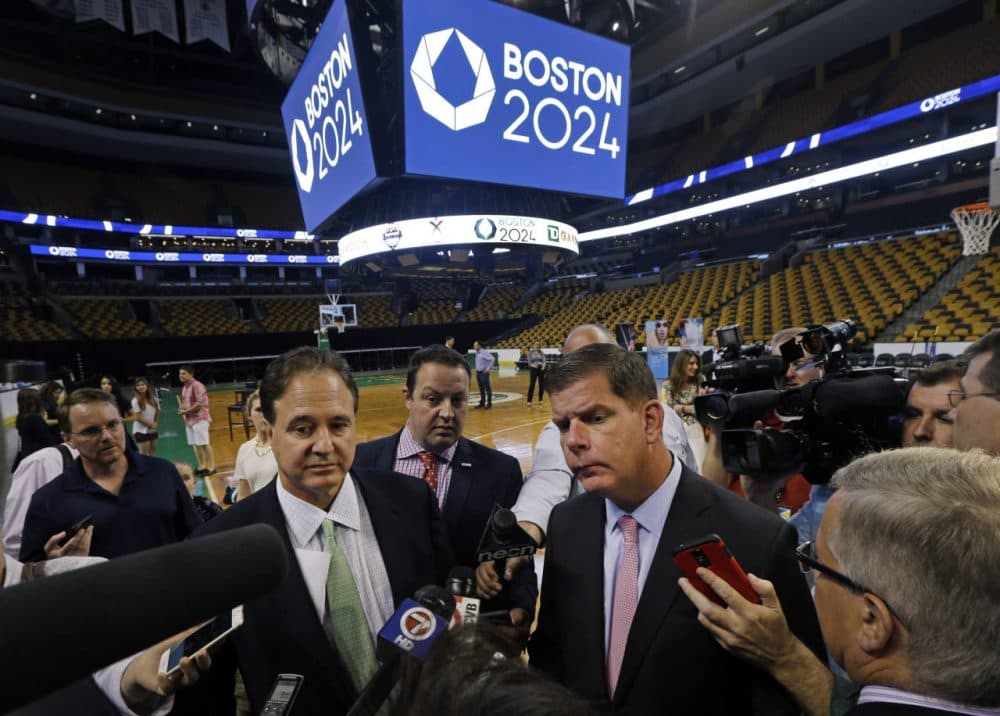Advertisement
Boston Mayor Wishes LA Luck In Possible Olympic Bid
Resume
Boston is torn over the city's now-failed Olympic bid.
On Monday, the U.S Olympic Committee pulled its support for Boston's plan to host the 2024 Summer Games after Boston Mayor Marty Walsh said he wouldn't put taxpayers on the hook for cost overruns. Now the second-guessing is on.
Did Boston miss a huge opportunity to showcase itself to the world? Or did it make the smart, responsible decision to protect itself from the financial burden of hosting the games? The mayor joins Here & Now's Jeremy Hobson to discuss those questions and more.
Interview Highlights: Marty Walsh
On the public concerns about Boston's bid
"I think it was a fear of the unknown. I think a lot of people weren't completely sure what an Olympic movement was all about, and how to host the Olympics. You've got to remember that it's only been seven or eight times in United States history that a city has gone for the Olympics. We've hosted the Olympics in America five times, or maybe six times with Lake Placid twice. But people don't really understand what it is, what the Olympics are. And there were some stories from Sochi, of the road, and some concerns about overruns and what's happening in Brazil. So a lot of those stories start to come to the United States, saying that the same thing's going to happen here in America."
How Boston's Big Dig fueled public concern
"That came up a few times in conversation. And I think that, the Big Dig, when you think about the project that was there, it was an incredible project. Putting the Southeast Expressway, the Central Artery, underground was actually an incredible project. But there were overruns and there was mismanagement on the management level of it that caused tremendous problems, and we're still paying for that. And I think that that idea probably added to it, but we weren't talking about putting a road underground, this was not going to be a publicly financed project. This was going to be mainly privately financed, and the public financing would have come ironically just in the infrastructure and the security piece of it."
On a possible Los Angeles bid for the 2024 Olympics
"I think it was a fear of the unknown. I think a lot of people weren't completely sure what an Olympic movement was all about, and how to host the Olympics."
"I wish them luck, if they bid for it. I know that the USOC had told me that Boston was their city and they weren't going anywhere else, but if LA comes into the mix I wish them luck, I wish them well. One of the first calls I received after we won the bid, I got a text from Mayor Garcetti from LA, congratulating me and wishing me well. And I would do the same to him. I think that it would be a great opportunity to bring the games back to the United States of America, however I think the way the rules are currently set up, it puts a United States city at a disadvantage because of that cost guarantee that has to be signed."
Responding to criticism from the USOC and IOC
"The USOC, and there's some great people on the board there, and I don't want to get into a back and forth with them, but they kept raising the bar on Boston all along. And they were raising the bar because of the International Olympic Committee, Thomas Bach's rules. And Thomas Bach's rules and regulations basically were saying to us that Boston and the taxpayers of Boston were going to have to pay for any overruns, or if the games got canceled, Boston would have to pick up the cost. And I don't know about Thomas Bach, but I represent people, and the people of Boston nor me as the mayor of Boston are going to allow taxpayers' money to be used to fix a problem that they clearly have internally, the IOC. The IOC needs to fix that language there, it's something that the USOC I know has concerns about, the people of LA will have concerns about it, the people of San Francisco will have concerns about it, the people of Washington, D.C. should have concerns about it."
Whether or not losing the Olympics hurts Boston's reputation
"All I know right now in Boston is that we have over $7 billion worth of construction going on, that's probably one of the largest amounts of construction in the country. Our population is 655,000 people, the largest since the '60s. Our unemployment rate is a little below 4 percent. We are on an economic high right now, we're moving forward. We have investors from around the world calling up my office regularly looking to invest in our city; we have developers from around the country and around the world wanting to come into Boston. So I think that when you talk about what's happening, if people aren't going to come to Boston because of the rules that we had to live by with the USOC and the IOC, there's not much I can do about that. But I do know that right now, wherever I go, whether it was the conference of mayors in September, the Aspen Ideas Festival in Colorado or the Vatican in Rome, everyone's talking about how great Boston is."
Guest
- Marty Walsh, mayor of Boston. He tweets @marty_walsh.
This segment aired on July 29, 2015.